|
|
|
Sort Order |
|
|
|
Items / Page
|
|
|
|
|
|
|
| Srl | Item |
| 1 |
ID:
144811
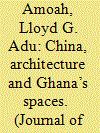

|
|
|
|
|
| Summary/Abstract |
Africa’s interaction with China is beginning to be marked tellingly by Chinese architectural inscriptions on the African cityscape which need to be deconstructed. The furore in the African press and academia that greeted the building and handing over by China of the African Union headquarters in Addis Ababa makes such an interrogation imperative. This study will attempt to offer some understanding of this nascent phenomenon using the Accra cityscape as an exemplary point of reference. In this regard this work seeks to locate the meaning of fortifications within contemporary global and local discourses on power, architecture, symbols, interests and international relations.
|
|
|
|
|
|
|
|
|
|
|
|
|
|
|
|
| 2 |
ID:
144809


|
|
|
|
|
| Summary/Abstract |
This paper is a preliminary reflection on China’s domestic development and its aid presence in Africa. “Development” had its day before the 1970s but then encountered de-constructive and re-constructive critics in the field of Development Anthropology. China’s conceptualization of development has not only drawn a lot from Western development discourse but also evolved with its own features, which deserve a critical reflection in terms of an “elusive discourse” and the “practical pursuit of welfare”, a seemingly paradoxical dichotomy. It follows with China’s foreign assistance or aid presence in Africa, which, the author holds, is imprinted with China’s development practice concepts and illustrated by a case of Chinese development aid in Ethiopia. The paper eventually discusses the would-be roles of Chinese anthropologists, who have been surprisingly absent in recent years, in contrast to Western academia’s intellectual tradition of widely reflecting development issues.
|
|
|
|
|
|
|
|
|
|
|
|
|
|
|
|
| 3 |
ID:
144808
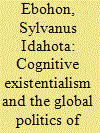

|
|
|
|
|
| Summary/Abstract |
This paper attempts to situate Nigeria’s capitulation to Cameroun in the Bakassi boundary conflict between the two nations within the context and logic of global politics driven by global states such as the United States of America, Great Britain, France and Germany. It makes a case for why and how a sub-regional war was averted within the Gulf of Guinea. The paper argued that although the crisis was a sub-regional inter-state boundary dispute which threatened to escalate into a sub-regional war within the Gulf of Guinea, it acquired a global stature within the context of the operational security architecture of AFRICOM that seeks to globalize security in the incipient second wave of neo-global governance. The crisis provided ample opportunity for the operationalization of the new geography of power in global politics, founded and driven by the mirror image of ‘cognitive existentialism’. The paper concludes that Obasanjo’s lowering of the Nigerian flag in Bakassi in the context of the new security architecture was fuelled more by the fears of an escalated anti-federal militant upsurge in the Niger Delta; the official records showing Bakassi as an oil axis; America’s incorporation of Bakassi into the Gulf of Guinea; the painful remembrance of the ugly Nigerian civil war experience; and America’s refusal to supply Nigeria arms in the event of a war with Cameroun, than by a global environment characterized by the low politics of environmental recreation, humanitarian intervention and the politics of human rights.
|
|
|
|
|
|
|
|
|
|
|
|
|
|
|
|
| 4 |
ID:
144807
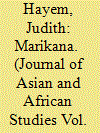

|
|
|
|
|
| Summary/Abstract |
This article analyses some of the reasons for the violent repression of the miners’ strike in Marikana, South Africa, in which 34 people died on 16 August 2012. It explores the economic and productive context which led the Rock Drill Operators to demand a wage increase outside the usual wage-bargaining structures. It goes on to examine the strikers’ subjectivity and the principles of their strike. Because the strike was organised independently of the main union, the National Union of Mineworkers, by miners demanding direct talks with their employer, as a sign of recognition, it illustrated a crisis of representation and embodied an alternative politics. The author argues that the African National Congress government was faced with a challenge to its instituted forms of political representation and, as a result, ordered the police to fire on the demonstrators.
|
|
|
|
|
|
|
|
|
|
|
|
|
|
|
|
| 5 |
ID:
144804
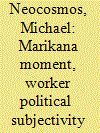

|
|
|
|
|
| Summary/Abstract |
The flag suits the filthy landscape, and our jargon drowns the sound of the drum.
In the interior we shall nourish the most cynical prostitution. We shall massacre all logical revolts. To the spicy, softened countries! – At the service of the most monstrous industrial or military exploitation. Until we meet again; here, no matter where. Conscripts of our good will, we shall have a ferocious philosophy; ignorant of science, cunning for comfort; let the rest of the world perish. This is the real way forward; full march ahead! (Rimbaud, 1986)
|
|
|
|
|
|
|
|
|
|
|
|
|
|
|
|
| 6 |
ID:
144805
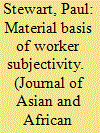

|
|
|
|
|
| Summary/Abstract |
This article presents an historical overview of the occupation of rock drillers in South African mines. It is argued that the critical productive role this occupation plays in the underground production process must be central to understanding why the rock drill operators (RDOs) initiated a major strike wave on South African platinum mines in 2012, what transpired at Marikana in August of that year and the 2014 industry-wide strike. Long established as an elite within the mining industry, the RDOs negotiated directly with management over the past 30 years beyond the ambit of representational politics. However, the migrant labour status, deplorable living conditions and memories of past struggles intersect with the impact of their working conditions underground. This article suggests that the historically identifiable objective location of these workers in production serves as the material basis for their political subjectivity.
|
|
|
|
|
|
|
|
|
|
|
|
|
|
|
|
| 7 |
ID:
144810


|
|
|
|
|
| Summary/Abstract |
Across the globe women are accessing national legislatures and executives in unprecedented numbers. Over the last 25 years several African countries have led the way in women’s representation in parliaments and, more recently, in cabinets. At the same time, governments and foreign donors are increasingly focusing on the role of traditional leaders in local-level politics as states democratize and decentralize across the continent. Once considered hopelessly undemocratic and patriarchal, traditional leaders are more recently viewed in many African countries as one half of a viable and effective hybrid system at the local level. In addition, whereas the role of chief has been largely the preserve of African men, African women are increasingly asserting a right to become chief. This article, using Botswana as a case study, suggests that the increased presence of women in national legislatures and executives may be having a symbolic representation effect on African women who are insisting that they too may access political power, even in positions formerly unavailable to them, such as chief. This article further suggests that, like their women counterparts in African parliaments, once they gain access to political office, women chiefs may substantively represent women’s interests, in venues such as a House of Chiefs and in their communities.
|
|
|
|
|
|
|
|
|
|
|
|
|
|
|
|
| 8 |
ID:
144806
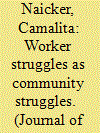

|
|
|
|
|
| Summary/Abstract |
This article deals with the changing spatial landscape of the mines in the post-apartheid era. It is here that the link between worker and community struggles becomes apparent, given the changing nature of space and community on the mines. It becomes more difficult to deny women’s roles and contributions to political life on the mines in South Africa when we are confronted with the Marikana massacre. For the first time, women on the mines made a public statement about living and working and being on the mines, a realm of experience previously ignored or silenced in most labour historiography. After the 1980s, mine compounds were ethnically desegregated and post-1994, mine companies began to offer a living out allowance (LOA) to mineworkers who preferred not to stay in the hostels. As a result, there was an immediate growth of shack settlements around the platinum belt. With the development of shack settlements has been the introduction of family life on the mines, which has brought with it a new form of community politics that have not been adequately addressed in the public sphere or in new labour literature. This shows how independently organised worker struggles are linked to, and reinforced by, the struggles of women and the community. More specifically the paper presents research undertaken in Marikana in November 2012 and it is an attempt to write a living history of people who currently occupy the shack settlement where most of the mineworkers involved in the 2012 strike live; it is called Nkaneng.
|
|
|
|
|
|
|
|
|
|
|
|
|
|
|
|
|
|
|
|
|